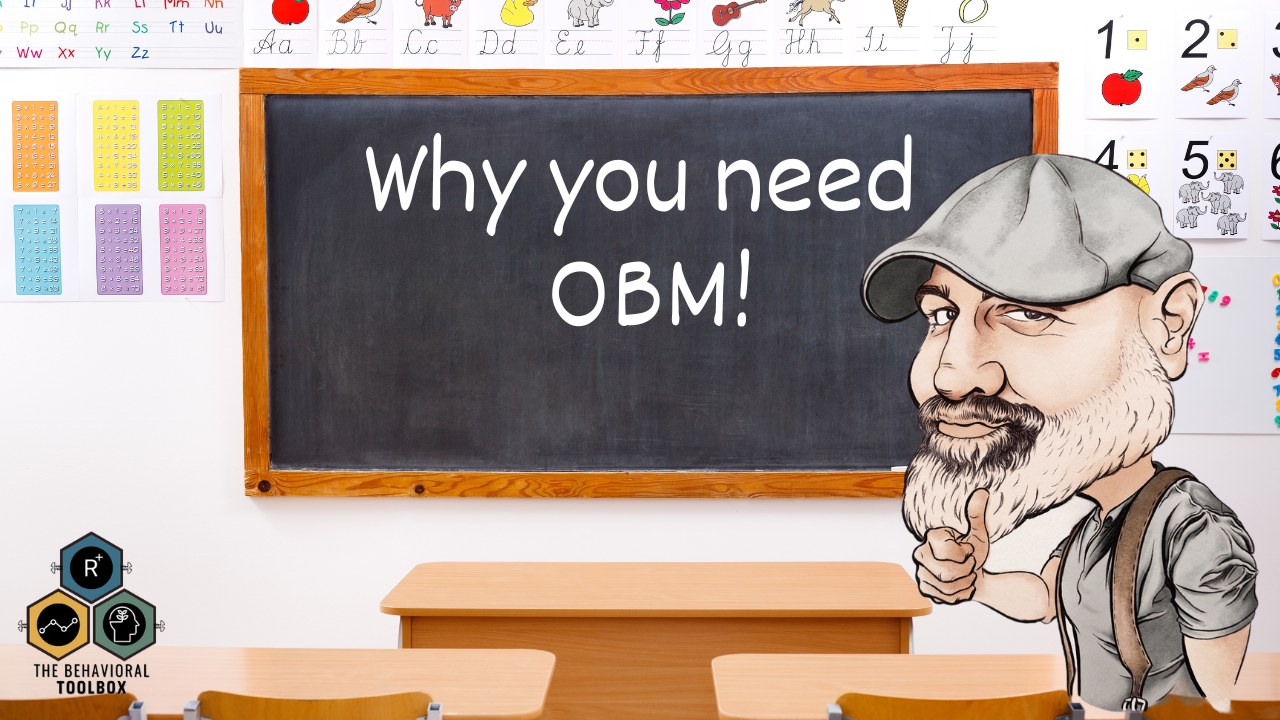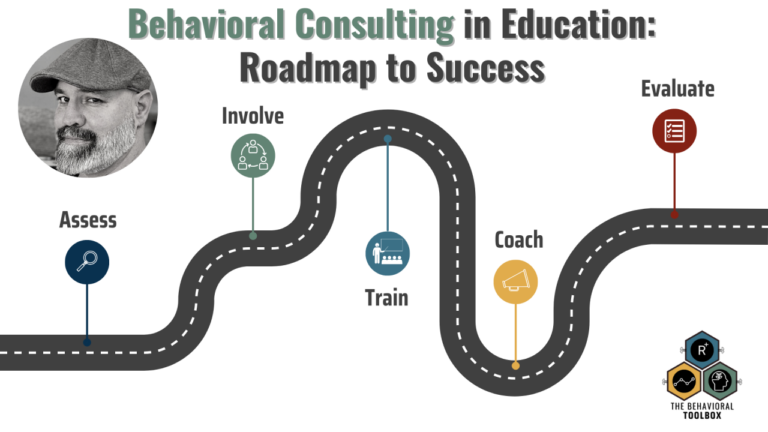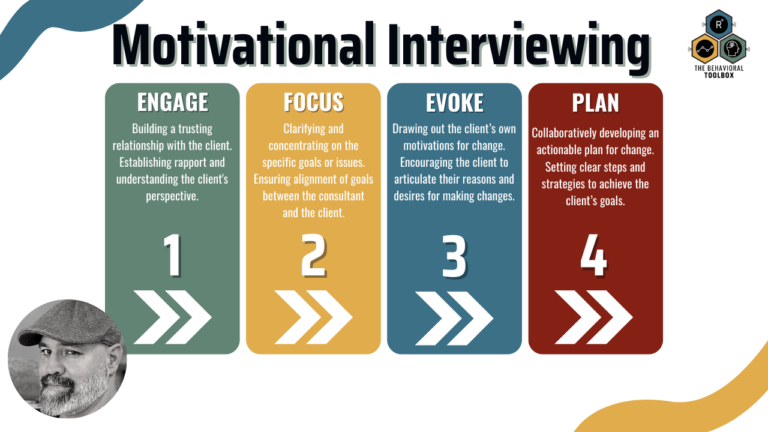Why All School-based Behavior Analysts Need OBM
As a district behavior analyst, my job was all about creating detailed plans and offering advice to improve schools. I was passionate about making a real difference and seeing real progress with student behavior. But despite my best efforts, it often felt like my recommendations were being shelved and things weren’t changing as I hoped. This was really frustrating.
Looking back, I realize now that I was suffering from something I like to call behavioral myopia. I was so focused on the students and their behavior that I wasn’t considering the role of the educators—the very people who are key to making any behavioral plan work. Just like students, teachers have their own motivations, stressors, and behaviors that impact how well they can implement new strategies.
In other words, educators are a lot like students in this setup. If we want to see real changes in student behavior, we need to understand what motivates and challenges teachers, too. It’s not just about handing over a plan and hoping for the best. I needed to shift my approach from being just a consultant to becoming a coach who helps build up the school’s own ability to manage and sustain these changes.
That’s where Organizational Behavior Management (OBM) comes in. OBM helps us look at the whole environment, including both student, teacher, and even school leader behaviors. It’s about creating systems that work for everyone involved. So, to really make a sustainable difference where we can fade out, we need to be able to put on our training hat, and then shift to our coaching hat using the principles of OBM.
The Role of Training and Coaching
To understand this shift, it’s important to recognize the distinct roles of training and coaching in behavioral change. Training is primarily focused on skill acquisition. It provides educators with the knowledge and tools they need to perform specific tasks or implement strategies. For example, training might involve teaching teachers how to apply new behavioral strategies or use specific classroom management techniques. This foundational skill development is antecedent strategy. And while it essential for initially getting behavior going, it is insufficient for success because, as we know, it is the consequences of behavior that that keep it going. This is where deliberate coaching comes in.
Deliberate Coaching (Gavoni & Weatherly, 2024), grounded in OBM, plays a vital role in the generalization of learned skills into the natural environment. It involves ongoing support and feedback to help educators apply the skills they’ve acquired in real-world settings. Deliberate Coaching helps ensure that new practices are not only learned but also integrated effectively into daily routines and come into contact with positive reinforcement. It addresses challenges, refines techniques, and supports educators in adapting their skills to diverse and evolving classroom situations.
In essence, training equips educators with the necessary skills, while Deliberate Coaching ensures these skills are applied effectively and sustainably in the classroom environment. Both are essential for achieving long-term success in behavioral interventions.
Why Behavior Analysts Need OBM

Moreover, the need for OBM becomes clear here. In a school district setting, especially when you’re not embedded in a single classroom, understanding and influencing behavior involves managing a performance chain where each link—student, teacher, administrator—interacts and impacts the others. OBM principles help address this complex web of behaviors by focusing on the overall environment and creating systems that support continuous improvement.
By integrating OBM, behavior analysts can effectively manage and sustain behavioral changes. OBM provides a framework for understanding and improving the behaviors of everyone involved, creating a more cohesive and supportive environment. It’s about making sure that both training and coaching lead to long-term success and sustainability, ensuring that the changes you implement truly make a lasting impact.
Here’s why OBM is essential for behavior analysts working in schools:
- Understanding the Broader Context: Schools are complex environments where success depends not only on student behavior but also on the behavior of teachers and administrators. OBM helps behavior analysts understand and influence the entire ecosystem of the school, addressing both student and adult behaviors to create a supportive environment for learning.
- Building Local Capacity: OBM emphasizes the importance of building internal capacity. By fostering local performance management systems, behavior analysts can empower schools to manage and sustain behavioral improvements independently. This approach reduces reliance on external consultants and ensures that schools have the tools and processes needed for ongoing success.
- Creating Sustainable Change: OBM principles focus on creating systems that support continuous improvement and adaptation. By applying OBM strategies, behavior analysts can help schools develop practices that evolve in response to new challenges and changing needs, leading to more enduring and effective behavioral changes.
- Enhancing Support Systems: OBM encourages the development of support networks and collaborative environments. By fostering a culture of mutual support and shared learning, behavior analysts can help schools create robust systems that facilitate the implementation and maintenance of behavioral strategies.
- Aligning Efforts with Organizational Goals: Just as OBM aligns individual behaviors with organizational goals, behavior analysts can use these principles to ensure that their interventions are aligned with the broader educational objectives of the school. This alignment helps to integrate behavioral strategies into the overall mission and vision of the school.
To truly drive lasting change and ensure that behavioral interventions are effective and sustainable, behavior analysts must expand their focus from individual student behavior to include the broader organizational context. Integrating Organizational Behavior Management principles is critical in this shift. By applying OBM strategies, behavior analysts can address the complexities of school environments, build local capacity, and foster a culture of continuous improvement. This comprehensive approach ensures that both educators and students are supported in achieving and maintaining positive behavioral outcomes. With this in mind, here are five OBM tips to help behavior analysts effectively empower schools and create lasting, positive changes in educational settings.
Five OBM Tips for Empowering Schools

- Set Realistic Expectations: Schools must understand that achieving sustainable changes in student behavior often requires adjustments in their own practices and environments. Behavior analysts should emphasize that while we can provide strategies and recommendations, the real work involves altering the environment in which students learn and behave. Unlike physical traits such as DNA or deeply ingrained learning histories that we cannot change, we can influence the classroom environment, management practices, and teacher behaviors.
- Train and Empower Educators: Provide comprehensive training that focuses on skill acquisition—equipping educators with the practical skills needed to apply behavioral strategies effectively. Training should cover not only the “how” but also the “why” behind these strategies, ensuring that teachers understand their purpose and can adapt them as needed.
- Develop a Local Performance Management System: Collaborate with schools to establish systems for monitoring and managing behavioral interventions. Create tools such as checklists, self-assessment forms, and feedback mechanisms to track progress and evaluate the effectiveness of strategies.
- Build a Support Network: Establish a network within the school where teachers and staff can share experiences, seek advice, and collaborate on solutions. This peer support system provides practical insights and encouragement, enhancing the implementation of behavioral strategies.
- Foster a Culture of Continuous Improvement: Promote a mindset where behavioral interventions are viewed as an ongoing process rather than a one-time fix. Encourage schools to embrace feedback, celebrate successes, and address areas for improvement proactively.
By transitioning from a consultant to a coach and integrating OBM principles, behavior analysts can drive meaningful and sustainable change in schools. The goal is not only to provide solutions but to empower educators to manage and sustain these solutions independently. This comprehensive approach improves the immediate educational environment and builds long-term capacity within schools, leading to better outcomes for both students and teachers.
Are You a Behavior Analyst Struggling to Make a Difference in Schools? Discover the Power of OBM!

If you are a behavior analyst working in or with schools, and you’re wondering why your interventions aren’t yielding the desired results, know that you’re not alone. Many behavior analysts find themselves shouldering the burden of improving school behavior on their own. The unspoken mantra often is, “You are the behavior person, so you take care of it.” But lasting change requires more than one person’s efforts.
To truly bring out the best in students, we must also bring out the best in educators. As a behavior analyst, your goal should be to design strategies that accelerate and sustain good practices throughout classrooms and schools. This means helping faculty, staff, and educational leaders develop sustainable habits that fit their unique contexts.
Developing these habits isn’t as simple as telling educators what to do. Changing habits at the classroom, school, or even district level requires a systematic approach to behavioral consulting. The ultimate aim is to build capacity so that educators can manage and prevent behavioral challenges independently.
Introducing Our Behavioral Consulting Module:
In this module, you’ll gain an overview of a behavioral consulting system grounded in Organizational Behavior Management (OBM). This system, your “Behavioral Toolbox,” comprises five key processes designed to make a positive difference across students, classrooms, schools, and districts. We will start by unpacking the first process, Assessing. You’ll learn essential steps for building relationships, understanding educators’ needs, identifying root causes of performance issues, and establishing realistic expectations of shared responsibilities.
Practical Tools You’ll Gain:
- The Acceptance Commitment Training Matrix
- Behavior Services Intake Form
- Performance Diagnostic Checklist
Regardless of your experience level, this course offers valuable insights and tools. For newcomers to behavioral consulting, you’ll find a mix of familiar concepts and new, helpful strategies. Even seasoned consultants will benefit by adding new tools to their arsenal, enhancing your success and easing your job’s stress and anxiety.
Take the Next Step:
Empower yourself with the knowledge and tools to make a lasting, positive impact in educational settings. Equip yourself with OBM principles to build capacity, improve outcomes, and foster sustainable change. Join us and start building your Behavioral Toolbox today!





